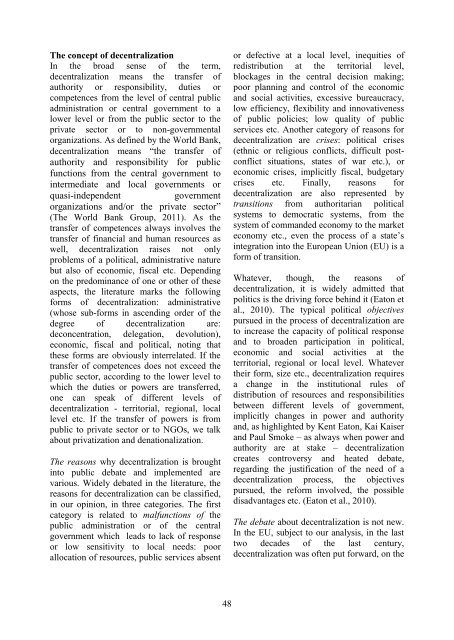Selected papers~ SPECIAL EDITION - Index of
Selected papers~ SPECIAL EDITION - Index of
Selected papers~ SPECIAL EDITION - Index of
Create successful ePaper yourself
Turn your PDF publications into a flip-book with our unique Google optimized e-Paper software.
The concept <strong>of</strong> decentralization<br />
In the broad sense <strong>of</strong> the term,<br />
decentralization means the transfer <strong>of</strong><br />
authority or responsibility, duties or<br />
competences from the level <strong>of</strong> central public<br />
administration or central government to a<br />
lower level or from the public sector to the<br />
private sector or to non-governmental<br />
organizations. As defined by the World Bank,<br />
decentralization means “the transfer <strong>of</strong><br />
authority and responsibility for public<br />
functions from the central government to<br />
intermediate and local governments or<br />
quasi-independent government<br />
organizations and/or the private sector”<br />
(The World Bank Group, 2011). As the<br />
transfer <strong>of</strong> competences always involves the<br />
transfer <strong>of</strong> financial and human resources as<br />
well, decentralization raises not only<br />
problems <strong>of</strong> a political, administrative nature<br />
but also <strong>of</strong> economic, fiscal etc. Depending<br />
on the predominance <strong>of</strong> one or other <strong>of</strong> these<br />
aspects, the literature marks the following<br />
forms <strong>of</strong> decentralization: administrative<br />
(whose sub-forms in ascending order <strong>of</strong> the<br />
degree <strong>of</strong> decentralization are:<br />
deconcentration, delegation, devolution),<br />
economic, fiscal and political, noting that<br />
these forms are obviously interrelated. If the<br />
transfer <strong>of</strong> competences does not exceed the<br />
public sector, according to the lower level to<br />
which the duties or powers are transferred,<br />
one can speak <strong>of</strong> different levels <strong>of</strong><br />
decentralization - territorial, regional, local<br />
level etc. If the transfer <strong>of</strong> powers is from<br />
public to private sector or to NGOs, we talk<br />
about privatization and denationalization.<br />
The reasons why decentralization is brought<br />
into public debate and implemented are<br />
various. Widely debated in the literature, the<br />
reasons for decentralization can be classified,<br />
in our opinion, in three categories. The first<br />
category is related to malfunctions <strong>of</strong> the<br />
public administration or <strong>of</strong> the central<br />
government which leads to lack <strong>of</strong> response<br />
or low sensitivity to local needs: poor<br />
allocation <strong>of</strong> resources, public services absent<br />
48<br />
or defective at a local level, inequities <strong>of</strong><br />
redistribution at the territorial level,<br />
blockages in the central decision making;<br />
poor planning and control <strong>of</strong> the economic<br />
and social activities, excessive bureaucracy,<br />
low efficiency, flexibility and innovativeness<br />
<strong>of</strong> public policies; low quality <strong>of</strong> public<br />
services etc. Another category <strong>of</strong> reasons for<br />
decentralization are crises: political crises<br />
(ethnic or religious conflicts, difficult postconflict<br />
situations, states <strong>of</strong> war etc.), or<br />
economic crises, implicitly fiscal, budgetary<br />
crises etc. Finally, reasons for<br />
decentralization are also represented by<br />
transitions from authoritarian political<br />
systems to democratic systems, from the<br />
system <strong>of</strong> commanded economy to the market<br />
economy etc., even the process <strong>of</strong> a state’s<br />
integration into the European Union (EU) is a<br />
form <strong>of</strong> transition.<br />
Whatever, though, the reasons <strong>of</strong><br />
decentralization, it is widely admitted that<br />
politics is the driving force behind it (Eaton et<br />
al., 2010). The typical political objectives<br />
pursued in the process <strong>of</strong> decentralization are<br />
to increase the capacity <strong>of</strong> political response<br />
and to broaden participation in political,<br />
economic and social activities at the<br />
territorial, regional or local level. Whatever<br />
their form, size etc., decentralization requires<br />
a change in the institutional rules <strong>of</strong><br />
distribution <strong>of</strong> resources and responsibilities<br />
between different levels <strong>of</strong> government,<br />
implicitly changes in power and authority<br />
and, as highlighted by Kent Eaton, Kai Kaiser<br />
and Paul Smoke – as always when power and<br />
authority are at stake – decentralization<br />
creates controversy and heated debate,<br />
regarding the justification <strong>of</strong> the need <strong>of</strong> a<br />
decentralization process, the objectives<br />
pursued, the reform involved, the possible<br />
disadvantages etc. (Eaton et al., 2010).<br />
The debate about decentralization is not new.<br />
In the EU, subject to our analysis, in the last<br />
two decades <strong>of</strong> the last century,<br />
decentralization was <strong>of</strong>ten put forward, on the


